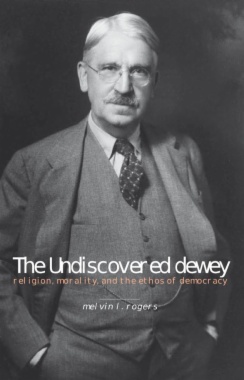The Undiscovered Dewey explores the profound influence of evolution and its corresponding ideas of contingency and uncertainty on John Dewey's philosophy of action, particularly its argument that inquiry proceeds from the uncertainty of human activity. Dewey separated the meaningfulness of inquiry from a larger metaphysical story concerning the certainty of human progress. He then connected this thread to the way in which our reflective capacities aid us in improving our lives. Dewey therefore launched a new understanding of the modern self that encouraged intervention in social and natural environments but which nonetheless demanded courage and humility because of the intimate relationship between action and uncertainty.
Melvin L. Rogers explicitly connects Dewey's theory of inquiry to his religious, moral, and political philosophy. He argues that, contrary to common belief, Dewey sought a place for religious commitment within a democratic society sensitive to modern pluralism. Against those who regard Dewey as indifferent to moral conflict, Rogers points to Dewey's appreciation for the incommensurability of our ethical commitments. His deep respect for modern pluralism, argues Rogers, led Dewey to articulate a negotiation between experts and the public so that power did not lapse into domination. Exhibiting an abiding faith in the reflective and contestable character of inquiry, Dewey strongly engaged with the complexity of our religious, moral, and political lives.
- Contents
- Preface
- Acknowledgments
- Abbreviations
- Introduction
- Dewey and the Problem of Intellectual Retrieval
- Avoiding the Criticism: Dewey's Darwinian Enlightenment
- Redirection: Religious Certainty and the Quest for Meaning
- The Plan of this Book
- PART ONE From Certainty to Contingency
- 1. Protestant Self-Assertion and Spiritual Sickness
- Dewey's Evasion of Protestant Self-Assertion and Spiritual Sickness
- Darwin, Science, and the Moral Economy of Self and Society
- Hodge and the Problem of Human Agency in the Wake of Evolution
- Reconciliation and the Quest for Certainty
- Dewey and the Meaningfulness of Modern Life
- 2. Agency and Inquiry After Darwin
- Inquiry and PhRonEsis: Dewey's Modified Aristotelianism
- The Existential Dimension of Action
- The Existential Dimension of Action and the Constitution of the Self
- The Existential Dimension of Action and its Temporal Quality
- The Psychological Orientation of Expectation
- Contingency and the Place of Intelligent Action
- Dewey's Modified Aristotellianism Revisited
- Inquiry and Weak Metaphysics
- PART 2 Religion, the Moral Life, and Democracy
- 3. Faith and Democratic Piety
- Democratic Self-Reliance: Emerson, Dewey, and Niebuhr
- Democracy and Self-Reliance
- Courage and Dependence: Reinhold Niebuhr Revisited
- Reading A Common Faith
- Democratic Piety
- Faith, Imagination, and the Ideal
- 4. Within the Space of Moral Reflection
- The Moral Life and Places of Conflict
- Within the Space of Moral Life
- The Character of Conflict Under Modern Conditions
- The Expanded Self: Deliberation, Imagination and Sympathy
- Dramatic Rehearsal and Imagination
- Principles and Cumulative Wisdom
- Sympathy and the Other
- 5. Constraining Elites and Managing Power
- The Danger of Political Pessimism: Between Lippmann and Wolin
- Limitations and Possibilities of Lippmann's Analysis
- Wolin and Fugitive Democracy
- Possibilities and Limitations of Wolin's Analysis
- Employing and Legitimizing Power
- Democratic Inquiry and Expertise
- Democracy as Managing Power
- Freedom as Nondomination
- The Permanence of Contingency: On the Precarious and Stable Public
- Continuity Between the Public and the State
- Discontinuity Between the Public and the State
- Epilogue
- Notes
- Bibliography
- Index

